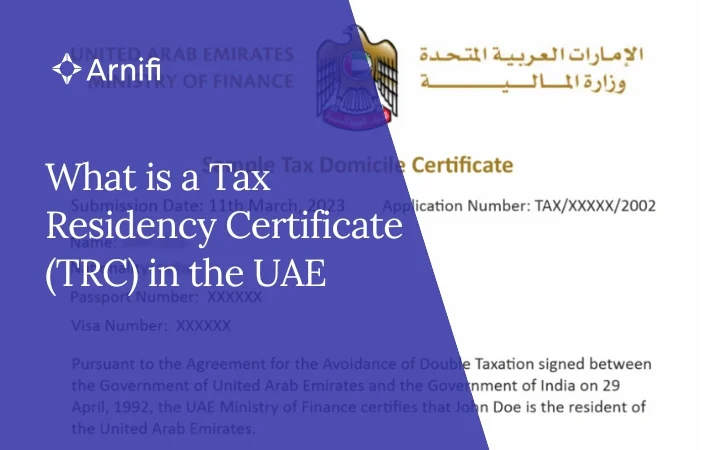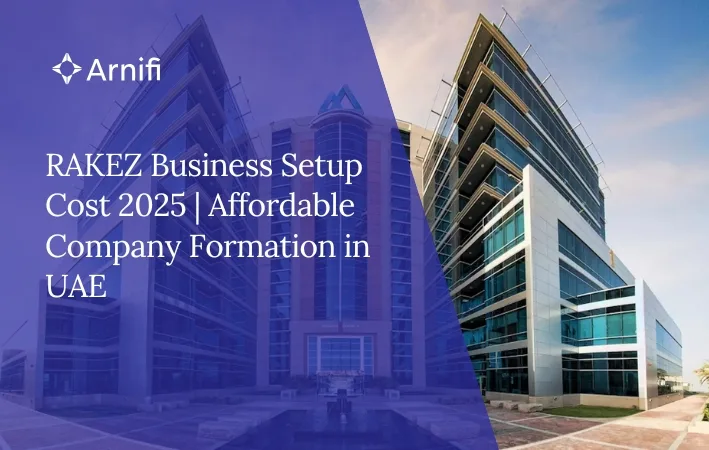Understanding Qualifying Income in UAE Corporate Tax
by Shethana Mar 04, 2024  15 MIN READ
15 MIN READ

Understanding corporate tax and its nuances, such as qualifying income, is essential for businesses operating within the UAE. In this blog, we will provide an overview of UAE corporate tax, delve into the concept of qualifying income, discuss the differences between free zone and mainland tax regimes, explore the tax rates for both, and highlight the corporate tax services available to businesses. So, let’s get started and unravel the intricacies of qualifying income in the context of UAE corporate tax.
Overview of UAE Corporate Tax
In the UAE, corporate tax is governed by the federal tax law. This law sets out the regulations and guidelines for corporations regarding their tax obligations. UAE corporate tax was introduced to diversify the government revenue sources and support the country’s sustainable economic development. The tax law applies to companies operating within the UAE, including those in the mainland and free zones. It outlines the taxable income, tax rates, and compliance requirements for corporations. Understanding the basics of UAE corporate tax is crucial for businesses to fulfill their tax obligations and navigate the complexities of the tax system.
Meaning and Importance of Corporate Tax
Corporate tax, also known as business tax, is a levy imposed on the taxable income of corporations. It is one of the primary sources of revenue for the government. The significance of corporate tax goes beyond revenue generation. Let’s explore why corporate tax is important:
- Funding public services through corporate taxes: Corporate taxes contribute to the funding of public services, such as infrastructure development, health, education, and social welfare programs. By paying their corporate taxes, businesses support the provision of essential services to the community.
- Contribution of corporate tax to economic development: Corporate tax plays a crucial role in the economic development of a country. It helps finance government initiatives aimed at promoting business growth, attracting foreign investment, and creating employment opportunities.
- Ensuring fairness and equity in tax collection: Corporate tax, when implemented effectively, promotes fairness and equity in the tax system. It ensures that corporations, regardless of their size, contribute their fair share to the country’s tax revenue based on their taxable income.
- Impact of corporate tax on business operations: The corporate tax rate and regulations can influence business decision-making, such as investment choices, profitability, and expansion plans. Understanding the tax implications of corporate activities is vital for effective financial management and strategic decision-making.
- In summary, corporate tax plays a crucial role in the financial sustainability of the government, supports economic growth, ensures fairness in tax collection, and affects business operations. It is essential for businesses to have a clear understanding of the tax law and the implications of corporate taxation to fulfill their tax obligations and make informed financial decisions.
The Role of Corporate Tax in UAE’s Economy
Corporate tax is a significant component of the UAE’s tax system, and it plays a vital role in the country’s economy. Here are some key aspects of the role of corporate tax in the UAE:
- Supporting infrastructure development through tax revenue: Corporate tax revenue contributes to the funding of infrastructure projects, such as transportation networks, utilities, and public facilities. These developments boost the overall business environment and attract both local and foreign investment.
- Stimulating economic growth via corporate taxes: By taxing corporate income, the UAE government generates revenue that can be reinvested in the economy. This funding promotes economic growth, job creation, and diversification of industries, contributing to the country’s long-term economic prosperity.
- Balancing fiscal responsibilities with corporate tax: Corporate tax revenue helps the government balance its fiscal responsibilities, including budgetary considerations and debt management. It provides the government with the means to fund public services, social welfare programs, and other expenditures necessary for the welfare of the UAE population.
- Enhancing social welfare programs with tax contributions: Corporate tax revenue supports various social welfare initiatives, such as healthcare, education, and housing. These programs improve the standard of living for UAE residents and contribute to the overall social stability of the country.
- Promoting financial stability in the UAE: The collection of corporate tax ensures the financial stability of the UAE government, enabling it to meet its financial commitments, maintain economic resilience, and respond to any unforeseen circumstances. It also establishes an environment of trust and confidence for businesses operating within the UAE.
- In conclusion, corporate tax plays a vital role in the UAE’s economy by supporting infrastructure development, stimulating economic growth, balancing fiscal responsibilities, enhancing social welfare programs, and promoting financial stability. Understanding the impact of corporate tax on the UAE’s economy is essential for businesses operating in the country.
Understanding Qualifying Income in the Context of UAE Corporate Tax
In the realm of UAE Corporate Tax, Qualifying Income holds paramount significance. It encompasses specific criteria delineated by regulatory authorities, impacting the taxable income of entities within the jurisdiction. Comprehending the nuances of Qualifying Income is pivotal for accurate tax computations and compliance with relevant legislation. Cabinet decisions and ministerial directives play a vital role in defining what constitutes Qualifying Income, further underscoring the intricate nature of corporate tax regulations in the UAE.
Definition of Qualifying Income
Identifying income aligning with UAE tax requirements involves categorizing income as qualifying under UAE tax legislation. Determining eligible income sources for taxation is crucial, along with clarifying the extent of qualifying income. It’s essential to differentiate between qualifying and non-qualifying income to ensure compliance.
Calculation of Qualifying Income
Assessing various techniques to calculate qualifying income entails the application of specific formulas for accurate results. It involves consolidating all income sources, ensuring precise assessments, and validating figures for taxation purposes.
Who qualifies as a Beneficial Recipient?
Being recognized as a beneficial recipient of qualifying income entails more than just generating such income; it necessitates meeting additional criteria. A Qualifying Free Zone Participant (QFZP) is mandated to carry out its primary income-generating operations within a Free Zone, maintain sufficient assets, and employ competent personnel commensurate with its undertaken activities. Additionally, it should incur operational expenses that align with its business model.
Moreover, a critical prerequisite involves the preparation of audited financial statements in accordance with the Controlled Tax Laws (CTL). These financial documents are indispensable in demonstrating compliance with tax regulations and confirming the eligibility of the income under the CTL.
For entities operating within Free Zones, conducting a thorough review of their activities and financial arrangements is prudent. This ensures eligibility for preferential tax treatment and compliance with the tax regulations of the UAE
Common Misconceptions about Qualifying Income
Addressing misconceptions surrounding what qualifies as income under UAE corporate tax law is crucial. By debunking myths and clarifying misunderstandings about qualifying income, taxpayers can make informed decisions. Educating individuals on common fallacies regarding qualifying income helps in dispelling false assumptions. It’s essential to understand the criteria set by the Ministry of Finance and the Cabinet Decision No. X to determine what constitutes taxable income. Overcoming these misconceptions leads to better compliance with the law and a clearer understanding of tax obligations.
Differences between Free Zone and Mainland Tax Regimes
Tax regimes in UAE vary between Free Zones and Mainland, impacting entities differently. Free Zone entities enjoy tax exemptions on corporate and personal income, while Mainland entities are subject to UAE corporate tax laws. Each regime has distinct regulatory requirements, with Free Zones attracting foreign ownership due to their advantageous tax policies. Understanding these differences is crucial for entities operating in UAE to optimize their tax structures and comply with relevant regulations.
Taxation in Free Zones
Taxation in Free Zones involves the governance of tax policies for entities in free zones, providing benefits like tax incentives. Companies in free zones must adhere to compliance obligations and grasp available tax exemptions. The taxation impact on business profitability is significant in free zones.
Taxation in Mainland
Exploring the regulatory landscape for businesses in the UAE mainland, companies outside free zones face distinct tax obligations. Variances in tax liabilities exist between free zones and mainland areas, influencing operational advantages and drawbacks. Businesses operating in the UAE mainland must carefully navigate compliance requirements under mainland taxation laws.
Qualifying Income for Entities Operating in the UAE: Understanding the Landscape

In the realm of corporate taxation (CT) in the United Arab Emirates (UAE), the concept of resident persons holds significant weight, as it delineates the boundaries of taxable income and attendant obligations. Entities established or recognized under UAE jurisdiction, including those situated within Free Zones, are categorized as resident persons for CT purposes.
For foreign entities, the determination of resident status hinges on the locus of effective management and control within the UAE. Consequently, even companies not formally incorporated in the UAE could fall under the purview of UAE CT if their core decision-making processes occur within the country’s borders.
The trigger for taxation for non-resident entities in the UAE typically involves the establishment of a permanent establishment (PE), the derivation of income from UAE sources, or a connection with the UAE through property-based earnings. Defining a PE becomes crucial in determining the tax liability for such entities. Conventionally, a PE is construed as a fixed place of business through which a non-resident conducts all or part of its operations within the UAE.
However, it’s essential to note that not all physical establishments qualify as a PE under the Controlled Tax Laws (CTL). The legislation explicitly excludes locations used solely for preparatory or auxiliary activities from the PE definition. This carve-out is instrumental as it shields certain ancillary operations from being subjected to taxation under the CTL.
Moreover, the CTL acknowledges the role of investment managers acting on behalf of non-resident entities. Such managers, categorized as independent agents, do not, by themselves, establish a PE for the entities they represent. This provision is particularly pertinent in the realm of financial transactions, encompassing commodities, real estate, securities, and other investments, allowing non-resident entities to engage local investment managers without triggering tax liabilities.
Additionally, the CTL extends its purview to family foundations, trusts, and similar entities, recognizing them as distinct legal entities. These structures, often established to administer and safeguard the assets of individuals or families, possess their own legal identities. Under specific circumstances, a family foundation may elect to be treated as a transparent ‘unincorporated partnership’ for CT purposes. Such a choice can shield the income of the foundation or trust from taxation in the UAE, presenting a tax-efficient avenue for asset management, governance, and succession planning.
Navigating Tax Treatment for Immovable Property within Free Zones: An Overview
Understanding the tax treatment of income derived from immovable property within Free Zones necessitates a comprehensive grasp of the property’s nature and the involved parties’ dynamics. Commercial property transactions carry distinct tax implications based on the income’s source. Income stemming from transactions within Free Zones enjoys tax exemptions, fostering intra-Free Zone trade and bolstering the UAE’s economic goals.
Conversely, for non-commercial property transactions, the tax rate remains consistent irrespective of the parties involved, simplifying tax obligations within Free Zones.
The de minimis rule assumes paramount importance in the realm of Free Zone taxation, delineating the permissible threshold of Non-Qualifying Revenue that a Free Zone Person (FZP) can accrue while retaining its status as a Qualifying Free Zone Person (QFZP).
FZPs must diligently monitor their Non-Qualifying Revenue to ensure compliance with the stipulated threshold, which is pegged at the lesser of 5% of their Total Revenue or USD 1.36 million (AED 5 million) within a tax period. Non-qualifying revenue encompasses proceeds from activities not aligned with the core operations incentivized by tax benefits.
Excluded Activities, encompassing regulated financial services and transactions involving immovable property, are expressly excluded from the calculation of Total Revenue, which represents the aggregate income of a QFZP before deductions.
If an FZP exceeds the de minimis threshold for Non-Qualifying Revenue, it risks reclassification and subsequent taxation at the standard rate for a minimum of five years. Additionally, a mainland branch of a QFZP typically qualifies as a domestic PE and is taxed accordingly.
These de minimis requirements serve as a pivotal barometer for FZPs to maintain their qualifying status, ensuring adherence to the CTL and capitalizing on tax advantages that solidify the UAE’s stature as a global business hub.
Corporate Tax Services For Free Zones and Mainland
Corporate tax services for free zones and mainland encompass a range of offerings tailored to the specific needs of businesses in these distinct territories. The services cover tax planning, compliance, and advisory services to ensure adherence to regulatory requirements and optimize tax obligations. Expertise in navigating the complex tax landscape in both free zones and mainland areas is crucial for entities to streamline operations and enhance financial efficiency.
Tax Planning Services
Tax planning services assist in optimizing tax liabilities for businesses. Tailored to meet the specific requirements of free zone and mainland enterprises, effective tax planning minimizes exposure and maximizes benefits. Professional advice on strategic tax planning enhances financial outcomes. Leveraging these services can significantly improve overall financial performance.
Tax Compliance and Reporting Services
Tax compliance and reporting services play a vital role in ensuring businesses fulfill tax obligations accurately, avoiding penalties, and maintaining legal adherence. Detailed reporting aids in efficient tracking of tax-related activities, streamlining processes. Reliable services promote transparency and accountability in financial operations.
Tax Advisory Services
For businesses in free zones and mainland areas, tax advisory services provide strategic guidance on intricate tax issues. Expert advisors optimize tax efficiencies, addressing specific concerns unique to each business. These tailored services aid in informed decision-making for tax planning, ensuring compliance with evolving tax regulations. Access to professional advice helps navigate the complexities of tax laws, offering insights that support businesses in optimizing their tax strategies.
Qualifying Activities and Excluded Activities in UAE Corporate Tax
Qualifying Activities in UAE Corporate Tax refer to activities that meet specific criteria for tax benefits, such as income generated from designated zones. Excluded Activities are those not eligible for these benefits and often include trading or service-related activities outside the designated zones. Understanding the distinction between Qualifying and Excluded Activities is crucial for tax planning and compliance in the UAE corporate tax framework.
Understanding Qualifying Activities
Qualifying activities in UAE corporate tax entail specific business operations that qualify for tax benefits, including tax incentives. Adherence to regulations governing these activities is crucial for optimizing taxes and aligning with the UAE’s economic development objectives. Understanding the breadth of qualifying activities is pivotal for strategic tax planning and leveraging available tax benefits. Compliance with these activities ensures businesses can make the most of tax incentives and contribute to the overall economic goals of the UAE.
Understanding Excluded Activities
Excluded activities in UAE corporate tax laws relieve certain tax obligations. Understanding them aids businesses in tax compliance and impact assessment. Entities in excluded activities face distinct tax consequences, shaping industry tax dynamics. Identifying these activities is vital for accurate tax liability evaluation.
De Minimis Rule in UAE Corporate Tax
Explanation and Importance of De Minimis Rule: The De Minimis Rule sets a threshold below which certain items are considered insignificant for taxation purposes. Understanding this rule helps in determining what small amounts can be excluded from tax calculations. Impact on Qualifying Income: The De Minimis Rule influences how minor incomes are treated, ensuring that trivial earnings do not unduly burden taxpayers. Comprehending this rule is crucial for accurate tax computations and compliance with UAE corporate tax regulations.
Explanation and Importance of De Minimis Rule
The De Minimis Rule simplifies tax approaches for low-income entities, easing compliance for small businesses. Understanding it is crucial for tax planning, as the threshold determines tax regulations’ applicability, offering relief to qualifying entities.
De Minimis Rule and its Impact on Qualifying Income
The impact of the De Minimis Rule on qualifying income thresholds can lead to significant changes for entities. Meeting the De Minimis criteria is crucial as it directly influences corporate tax considerations based on income levels. Compliance with this rule can affect the determination of qualifying income, potentially shifting an entity’s tax status. Entities must understand how the De Minimis Rule impacts their financial standing to ensure compliance and accurate tax reporting.
How Does the Definition of Qualifying Income Impact Free Zone Entities?
The impact of qualifying income definition on free zone entities is significant. Meeting income criteria determines tax exemptions, shaping compliance and tax obligations. Understanding this definition is crucial for navigating the taxation landscape in free zones.
Conclusion
In conclusion, understanding qualifying income is crucial in navigating the complexities of UAE corporate tax. It plays a vital role in determining tax liabilities and ensuring compliance with regulations. Clear definitions, calculations, and distinctions between free zone and mainland taxation are essential for businesses operating in the UAE. By grasping the nuances of qualifying income and engaging in strategic tax planning, organizations can optimize their tax positions and mitigate risks. Seeking professional corporate tax services tailored to free zones and mainland operations can further enhance financial management and regulatory adherence in the dynamic UAE business landscape.
About Arnifi
Arnifi is digital first Corporate service provider helping companies enter the Middle East region, starting with UAE and Saudi Arabia markets. Founded and backed by professionals from Amazon, Souq and other large companies operating in KSA – the team understands what it takes to succeed as a startup in both UAE and Saudi Arabian markets, apart from going through the setup process multiple times. Arnifi will provide a truly digital experience to entry and scale up of companies both UAE and Saudi Arabia. The Arnifi promise is simple, yet revolutionary, use technology and a great team to provide transparency, efficiency and great customer experience in the whole process. Check out at – www.Arnifi.com for more details.
ALSO READ: UAE Corporate Tax Background and Landscape: Key Insights
Top UAE Packages

Related Articles
Top UAE Packages



